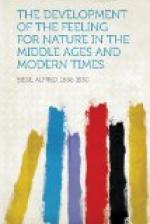Splendour of colour was everything with Calderon, but it was splendour of so stiff and formal a kind, that, like the whole of his intensely severe, even inquisitorial outlook, it leaves us cold.
We must turn to Shakespeare to learn how strongly the pulse of sympathy for Nature could beat in contemporary drama. Goethe said: ’In Calderon you have the wine as the last artificial result of the grape, but expressed into the goblet, highly spiced and sweetened, and so given you to drink; but in Shakespeare you have the whole natural process of its ripening besides, and the grapes themselves one by one, for your enjoyment, if you will.’
In Worship at the Cross there is pious feeling for Nature and mystical feeling side by side with an obnoxious fanaticism, superstition, and other objectionable traits[20]; and mystical confessions of the same sort may be gathered in numbers from the works of contemporary monks and nuns. Even of such a fanatic and self-tormentor as the Spanish Franciscan Petrus von Alcantara (1562), his biographer says that despite his strict renunciation of the world, he retained a most warm and deep feeling for Nature.
’Whatever he saw of the outer world increased his devotion and gave it wings. The starry sky seen through his little monastery window, often kept him rapt in deep meditation for hours; often he was as if beside himself, so strong was his pious feeling when he saw the power and glory of God reflected in charming flowers and plants.’
When Gregorio Lopez (1596), a man who had studied many sides of Nature, was asked if so much knowledge confused him, he answered: ’I find God in all things, great and small.’ Similar remarks are attributed to many others.
Next to Leon, as a poet in enthusiasm and mysticism, came St Teresa von Avila. She was especially notable for the ravishingly pretty pictures and comparisons she drew from Nature to explain the soul life of the Christian.[21]
In all these outpourings of mystic feeling for Nature, there was no interest in her entirely for her own sake; they were all more or less dictated by religious feeling. It was in the later German and Italian mystics—for example, Bruno, Campanella, and Jacob Boehme—that a more subjective and individual point of view was attained through Pantheism and Protestantism.
The Protestant free-speaking Shakespeare shewed a far more intense feeling for Nature than the Catholic Calderon.
CHAPTER VI
SHAKESPEARE’S SYMPATHY FOR NATURE




